- Home
- H A CULLEY
WHITEBLADE
WHITEBLADE Read online
WHITEBLADE
By
H A Culley
Kings of Northumbria - Book One
Oswald the Whiteblade,
King of Northumbria, Warrior and Saint
Published by Orchard House Publishing
First Kindle Edition 2016
Text copyright © 2016 H A Culley
The author asserts the moral right under the Copyright, Designs and Patents Act 1988 to be identified as the author of this work.
All Rights Reserved. This book may not be reproduced in any form, in whole or in part, without written permission from the author.
Cover Image: © iStock
Table of Contents
List of Principal Characters
Place Names
Glossary
Author’s Note
Introduction
Chapter One – Flight into Exile
Chapter Two – The Isle of Iona
Chapter Three – Coll and Tiree
Chapter Four – Rònan
Chapter Five – Rathlin Island
Chapter Six – Loch Fyne
Chapter Seven – The Isle of Arran
Chapter Eight – Return to Bebbanburg
Chapter Nine – Dùn Add and the Land of the Picts
Chapter Ten – The Battle of Leithet Midind
Chapter Eleven – Arran
Chapter Twelve – The Invasion of Bute
Chapter Thirteen – The Death of Kings
Other Novels by H A Culley
About the Author
List of Principal Characters
(In alphabetical order)
Historical characters are shown in bold type
Acha – Widow of Æthelfrith and sister of Edwin, both kings of Northumbria
Æbbe – Acha’s only daughter; later Abbess of Ebchester and founder of Coldingham Priory
Æthelfrith – King of Northumbria who was killed in battle in 616 AD; the father of Eanfrith, Oswald, Oswui and their other siblings
Ælfric – King of Deira until 604 AD when Æthelfrith deposed and killed him. Father of Osric
Aidan – An Irish monk and missionary; later Bishop of Lindisfarne, who is credited with converting Northumbria to Christianity
Alaric – A Northumbrian in exile; helmsman of the Holy Saviour
Beornwulf – A Northumbrian noble in exile and shipmaster of the Seraphim
Belin map Neithon – King of Strathclyde
Cadwaladr – Cadwallon’s son
Cadwallon ap Cadfan – King of Gwynedd
Congal Claen – Grandson of Fiachnae and nephew of Eochaid
Connad – King of Dal Riada
Domnall Brecc – King of Dal Riada after Connad
Eanfrith – Oswald’s half-brother, King of Bernicia in 633 AD
Eadfrith – Edwin’s second son; captured by Cadwallon
Edwin – Acha’s brother, who usurped the throne of Northumbria after the death of Oswald’s father, Æthelfrith, the king who first united Northumbria
Eochaid Iarlaithe mac Lurgain – Son of Fiachnae of the Ulaidh
Fiachnae mac Báetáin - King of the Ulaidh in Ulster
Fianna – The daughter of a farmer on Bute who Oswiu took as his lover
Finnian – A monk originally from Iona who traveled throughout Ireland as a missionary
Fergus – King of Islay
Gytha – The enslaved daughter of a Mercian Thegn, later Oswald’s first wife
Jarlath – A captured Irish boy, body slave to Oswald
Keeva – Jarlath’s sister, also a slave and Oswald’s mistress
Œthelwald – Oswald’s son, later King of Deira
Offa – Oswald’s youngest brother
Osguid – Oswald’s next eldest brother
Oslac – The third of Acha’s sons, Oswald’s brother
Oslaph – The fourth of Acha’s sons, Oswald’s brother
Osric – Edwin’s cousin, King of Deira during 633 AD
Oswald – Second son of Æthelfrith of Bernicia and eldest son of Acha of Deira, later King of Northumbria. A noted warrior and ruler who, with Aidan, spread Christianity throughout Northumbria
Oswin – Oswald’s cousin who fought at his side in Ulster
Oswiu –Oswald’s next to youngest brother, who later became King of Bernicia, a devoted Christian who established a number of monasteries
Penda – King of Mercia, a pagan
Rhieinmelth – Princess of Rheged and heiress to its throne; later Queen of Northumbria
Ròidh – A Pictish prince who became Aidan’s acolyte
Rònan – A captured Pictish boy, Oswald’s body slave and friend
Place Names
(In alphabetical order)
I find that using the correct place name for the particular period in time may be authentic, but it is annoying to have to continually search for the modern name if you want to know whereabouts the place is in relation to other places in the story. However, using the ancient name adds to the authenticity of the tale. I have therefore compromised by using the modern name for cities, settlements and islands except where the ancient name is relatively well known, at least to those interested in the period. These are listed below:
Bebbanburg – Bamburgh, Northumberland
Bernicia – The modern counties of Northumberland, Durham, Tyne & Wear and Cleveland in the North East of England. At times Goddodin was a subsidiary part of Bernicia
Caer Luel – Carlisle in Cumbria
Caledonia – Scotland
Dal Riada – Much of Argyll and the Inner Hebrides
Deira – North and South Yorkshire and northern Humberside
Dùn Èideann – Edinburgh
Eoforwīc – York
Elmet – West Yorkshire
Gwynedd – North Wales including Anglesey
Mercia – Roughly the present day Midlands of England
Northumbria – Bernicia, Elmet and Deira. At times it also included Rheged and Goddodin
Pictland – The confederation of kingdoms including Shetland, the Orkneys, the Outer Hebrides, Skye and the Scottish Highlands north of a line running roughly from Skye to the Firth of Forth
Rheged – A kingdom of Ancient Britons speaking Cumbric, a Brythonic language similar to Old Welsh, which roughly encompassed modern Lancashire and Cumbria in England and, at times, part of Galloway in Scotland
Strathclyde – South East Scotland
Glossary
Ætheling – Literally ‘throne-worthy’. An Anglo-Saxon prince
Bretwalda – In Anglo-Saxon England, an overlord or paramount king accepted by other kings as their leader
Currach – A boat, sometimes quite large, with a wooden frame over which animal hides are stretched and greased to make them waterproof
Cyning – Term of respect used when speaking to a king
Hereræswa - Military commander or general. The man who commanded the army of a nation under the king
Seax – A bladed weapon somewhere in size between a dagger and a sword, mainly used for close-quarter fighting where a sword would be too long and unwieldy
Thegn – In Anglo-Saxon England, a man who held a certain amount of land from the king or from a nobleman, ranking between an ordinary freeman and a hereditary noble. In Scotland, a man, often the chief of a clan, who held land from a Scottish king
Ulaidh – A confederation of dynastic-groupings that inhabited a provincial kingdom in Ulster (north-eastern Ireland) and was ruled by the Rí Ulad or King of the Ulaidh. The two main tribes of the Ulaidh were the Dál nAraidi and the Dál Fiatach
Uí Néill – An Irish tribe who claimed descent from Niall Noigiallach (Niall of the Nine Hostages), a historical King of Tara who died about 405. The Uí Néill tribe was divided into two main branches, each c
lan claiming descent from one of his sons:
The Northern Uí Néill branch:
· Conall Gulban, ancestor of the Cenél Conaill dynasty
· Eógan, ancestor of the Cenél nEógain dynasty
The Southern Uí Néill branch:
· Éndae, ancestor of the Cenél nÉndai
· Coirpre, ancestor of the Cenél Coirpri dynasty
· Lóegaire, ancestor of the Cenél Lóegaire dynasty
· Conall Cremthainne, ancestor of the Clann Cholmáin and Síl nÁedo Sláine
· Fiachu, ancestor of the Cenél Fiachach
White Christ – A pagan term for Jesus Christ, possibly in reference to the white robes worn for baptism.
Author’s Note
In the early seventh century AD, Britain was divided into over twenty petty kingdoms. I have listed them here for the sake of completeness, though only a few of them feature significantly in the story. A few others get a passing mention. From north to south:
Land of the Picts – Probably seven separate kingdoms in all, in the far north and north-east of present day Scotland
Dal Riada – Western Scotland including Argyll and the Isles of the Hebrides. Also included part of Ulster in Ireland from where the main tribe – the Scots – originated
Goddodin – Lothian and Borders regions of modern Scotland – then subservient to Bernicia and so part of Northumbria
Bernicia – The north-east of England. Part of Northumbria
Strathclyde – South East Scotland.
Rheged – Modern Cumbria and Lancashire in the north-west of England. A client kingdom of Northumbria
Deira – North, East and South Yorkshire
Elmet – West Yorkshire
Lindsey – Lincolnshire and Nottinghamshire
Gwynedd – North Wales
Mercia – Most of the English Midlands
East Anglia – Norfolk, Suffolk and Cambridgeshire
Powys – Mid Wales
Middle Anglia – Bedfordshire, Northamptonshire and Warwickshire
Dyfed – South-west Wales
Kingdom of the East Saxons – Essex
Hwicce – South-east Wales, Herefordshire and Gloucestershire
Kingdom of the Middle Saxons – Home counties to the north of London
Wessex – Southern England between Dumnonia and the Kingdom of the South Saxons
Kent – South-eastern England south of the River Thames
Kingdom of the South Saxons – Sussex and Surrey
Dumnonia – Devon and Cornwall in south-west England
Little is known for certain about Oswald’s life in exile. We do know he fled to Dal Riada and that he probably spent some time fighting in Ireland, where he acquired the nickname Whiteblade. We also know that he spent part of his exile at the monastery on Iona and that he was converted to Christianity at some stage in his exile.
I have taken some liberties with the accepted historical facts for the sake of the story. This is a time about which there is little written evidence and what exists is sometimes conflicting. The record of kings of the Ulaidh (in Ulster, Ireland) lists different kings at the same time, which probably means that they split into factions, each with their own leaders who called themselves king. The same is true of the kings of Dal Riada.
Aidan was in reality older than Oswald, although I have made them the same age. Connad died and Domnall Brecc came to the throne of Dal Riada later than I have portrayed by a few years. I have simplified the political situation in Ireland because it was far too complex for a novel.
There is little evidence what type of ships or boats the people of ancient Britain used in the seventh century AD. Obviously there must have been some, especially on the west coast, as that was the main means of transport – and the only way of travelling between the many islands of Dal Riada. As many are familiar with the Scottish birlinn – a type of galley – of the Middle Ages, I have used that term.
Apart from a list of their names, nothing is known about four of Oswald’s brothers. Only Oswiu, who became King of Bernicia after Oswald’s death, is mentioned in various records of the time.
Oswald married the King of Wessex’s daughter, Cyneburga, sometime after he became king in 634. He has only one recorded son, Œthelwald, who began ruling Deira in 651. It is thought that he can’t have been Cyneburga’s son as that would have made him too young to be chosen as king in 651. I have therefore assumed that he was the son of an earlier marriage during Oswald’s exile.
Introduction
At the time of Oswald’s birth in 604 AD, the island we now call Britain was divided between the Britons, a Celtic people, in the west and Germanic invaders in the east. Those in the north (Northumbria) and the centre (Mercia) were Angles in the main, whilst those in the south were Saxons, with Jutes controlling part of Kent and much of Hampshire. All three came from the north coast of Germany and what is now known as Schleswig-Holstein. The Celts themselves were divided between those who spoke Gaelic and those who used the Brythonic languages.
Northumbria itself was a recent creation; formerly it was two kingdoms, Deira in the south and Bernicia (including Goddodin) in the north. This is very simplistic, but a detailed explanation of the frequently changing political map of Britain in the seventh century has no place in a novel.
Oswald was the eldest son of Æthelfrith, King of Bernicia and his second wife, Acha, a member of the Deiran royal line who Æthelfrith married after he’d conquered Deira to consolidate his position as ruler of the combined kingdoms. However, Æthelfrith also had a son by his first wife, Bebba, called Eanfrith.
Æthelfrith was killed in battle around 616 by the King of East Anglia. As Oswald was twelve at the time, he was too young to fight for his father’s crown and his uncle, Acha’s brother Edwin, became king of Northumbria. As he had publicly announced his intention of killing Æthelfrith’s sons to eliminate any future opposition to his rule, Acha, Oswald and his brothers were forced to flee from Bernicia. Oswald spent the remainder of his youth in the Scottish kingdom of Dal Riada in the north west of the island of Britain, where he was converted to Christianity. Dal Riada (also written as Dalriata) was a Gaelic kingdom inhabited mainly by a tribe known as the Scots, who later gave their name to the whole country, much as England derives its name from the Angles.
Dal Riada included parts of present-day western Scotland and part of Ulster in Ireland. In the late sixth to early seventh centuries it roughly encompassed present-day Argyll, Lochaber and some of the isles of the Inner Hebrides in Scotland and Counties Antrim and Down in Ulster. Oswald is thought to have gained a reputation as a warrior in Ireland during his period of exile, earning himself the nickname of Whiteblade.
In 633, when Oswald would have been about 29, Edwin was killed by Cadwallon ap Cadfan, the King of Gwynedd, in alliance with Penda of Mercia, at the Battle of Hatfield Chase. Following Edwin’s death, Northumbria was divided once more and Oswald’s half-brother, Eanfrith, became King of Bernicia, whilst Osric, a cousin of Edwin’s and Acha’s, claimed the throne of Deira. Eanfrith and Osric didn’t last long, as both were killed by Cadwallon when he ravaged Northumbria during the year following Edwin’s death.
When Oswald returned after eighteen years of exile to claim the vacant crown of Northumbria, his first priority was to defeat Cadwallon and drive him out of his new kingdom.
Chapter One – Flight into Exile
616 AD
Oswald was fighting a giant with a sword of fire. Each time the giant lunged to grab hold of the small boy, Oswald darted out of his way and brought his flaming sword down to scorch the hairs on the giant’s forearms. Suddenly, the monster managed to grab his shoulder and started to shake him roughly. He awoke from his dream to find his ten year old brother Osguid, telling him to get up and get dressed.
‘Why? What’s happening?’
Before the boy could answer, his mother, Acha, Queen of Northumbria, swept into the room accompanied by three of his other brothers, including the four year-old Osw
iu, who was clutching at her skirts.
‘Get up now, Oswald,’ she said with some asperity.
He quickly did as he was told, puzzled at his mother’s tone. She never shouted at him or was cold towards him; not that he was her favourite. She loved all of her seven children equally, or at least appeared to do so.
‘Boys, we must flee Bebbanburg tonight. You brother Eanfrith has already gone to seek refuge with his mother’s people, the Picts. Edwin will seek him there, so we will head for Dal Riada. Its king, Connad, was ever your father’s ally.’
Eanfrith was their half-brother and at seventeen, was five years older than Oswald. His mother had been Bebba, a Pictish princess, after who King Æthelfrith had named the fortress on the east coast of Northumbria from where he had ruled his kingdom.
As he finished dressing, Oswald turned to the impatient Acha.
‘Mother, why must we flee? What has happened? Where’s father?’
Acha’s shoulders sank and she fought back her tears. At this Oswiu’s face crumpled and the small boy started to sob, worried and uncertain about what was happening. Oswald stood staring at the two of them. The three other boys stood there, afraid, but determined not to cry. Oswald’s mother had always been his rock – his father was someone he hardly knew – and he felt certain something bad must have happened for her to be this disturbed. Before his mother told them, he knew somehow that his father had lost the battle against Edwin, Acha’s brother, who was trying to take the kingdom from him. The cosy world he had known for the past twelve years was coming to an end.
‘Æthelfrith has been killed in battle by Raedwald, the King of East Anglia, aiding your wretched uncle Edwin, who has declared himself King of Northumbria in your father’s place.‘
‘But why would he want us dead? Eanfrith, yes; he’s father’s heir and no relation to him, but we are his nephews,’ Oswald asked, puzzled.

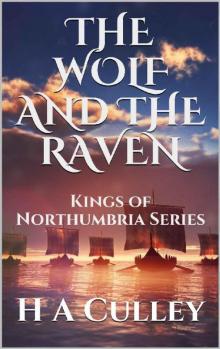 The Wolf and the Raven
The Wolf and the Raven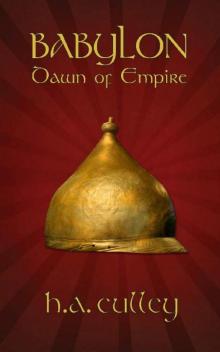 Dawn of Empire
Dawn of Empire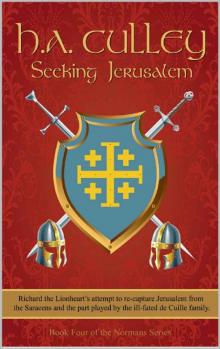 Seeking Jerusalem
Seeking Jerusalem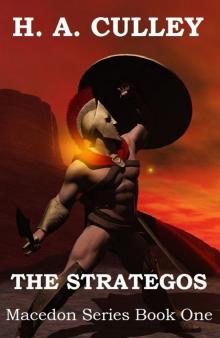 The Strategos
The Strategos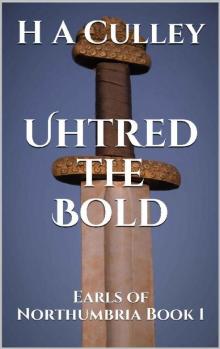 Uhtred the Bold
Uhtred the Bold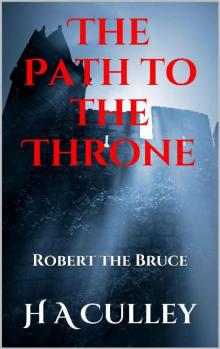 The Path to the Throne
The Path to the Throne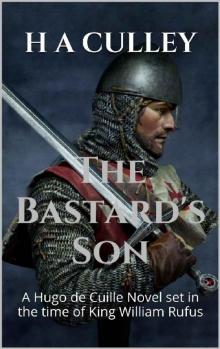 The Bastard's Son
The Bastard's Son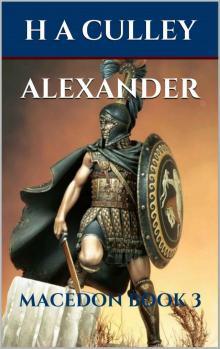 Alexander
Alexander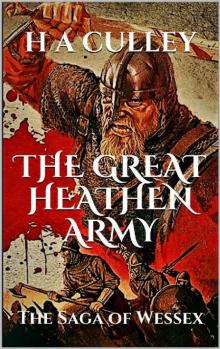 The Great Heathen Army
The Great Heathen Army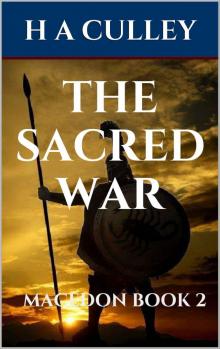 The Sacred War
The Sacred War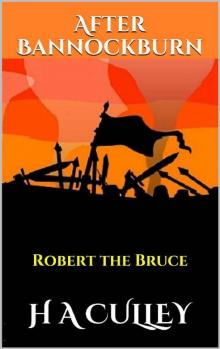 After Bannockburn
After Bannockburn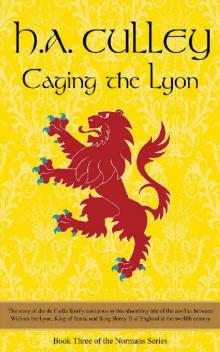 Caging the Lyon
Caging the Lyon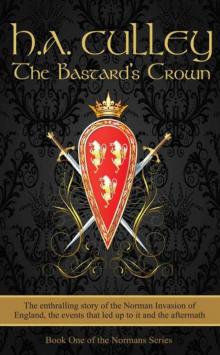 The Bastard's Crown
The Bastard's Crown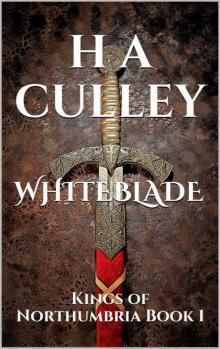 WHITEBLADE
WHITEBLADE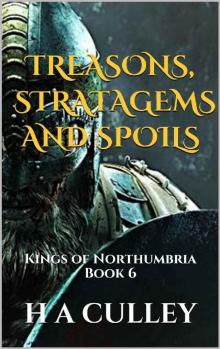 TREASONS, STRATAGEMS AND SPOILS: Kings of Northumbria Book 6
TREASONS, STRATAGEMS AND SPOILS: Kings of Northumbria Book 6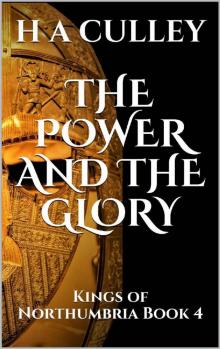 THE POWER AND THE GLORY: Kings of Northumbria Book 4
THE POWER AND THE GLORY: Kings of Northumbria Book 4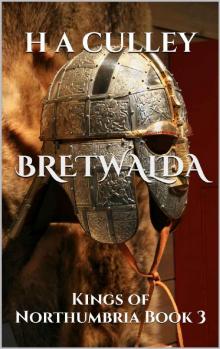 BRETWALDA: Kings of Northumbria Book 3
BRETWALDA: Kings of Northumbria Book 3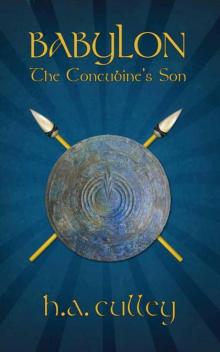 The Concubine's Son
The Concubine's Son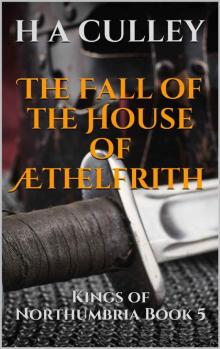 The Fall of the House of Æthelfrith: Kings of Northumbria Book 5
The Fall of the House of Æthelfrith: Kings of Northumbria Book 5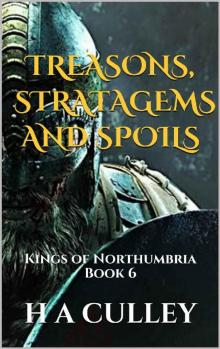 TREASONS, STRATAGEMS AND SPOILS
TREASONS, STRATAGEMS AND SPOILS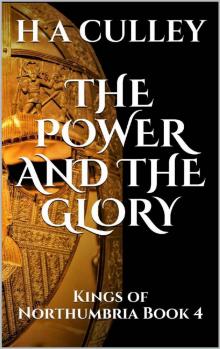 THE POWER AND THE GLORY
THE POWER AND THE GLORY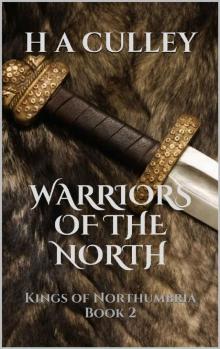 WARRIORS OF THE NORTH
WARRIORS OF THE NORTH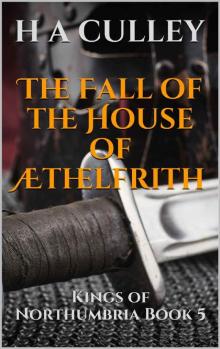 The Fall of the House of Æthelfrith
The Fall of the House of Æthelfrith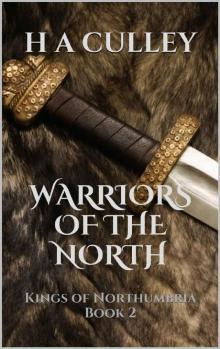 WARRIORS OF THE NORTH: Kings of Northumbria Book 2
WARRIORS OF THE NORTH: Kings of Northumbria Book 2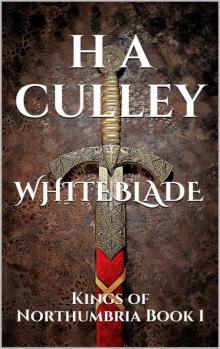 WHITEBLADE: Kings of Northumbria Book 1
WHITEBLADE: Kings of Northumbria Book 1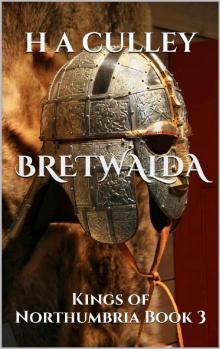 BRETWALDA
BRETWALDA